[NOTE: I wrote most of this post prior to our school’s first direct experience with COVID yesterday. I considered delaying or rewriting this post because I do not wish to appear cavalier or tone deaf when so many families and teachers are carrying anxiety into our first day of in-person school. However, as real – and as sad – as this “new normal” may be, it is our new normal. And I believe that part of making that true means that we will need to resume talking about things other than COVID. So without further adieu…]
There is obviously nothing more important than the safety of our students, teachers, families and community. That being said, it has been wonderful to be reminded this week why we are investing so much time and energy and so many resources to be able to both safely reopen for in-person learning and provide high-quality educational, social and spiritual experiences for distance learning. It is because we love to teach children!
So, for one blog post at least, let’s take a break from COVID safety procedures and protocols…
You may recall that despite the challenges that last spring brought us, we learned a lot through being forced into distance learning. We summarized those gleanings in a blog post that became a slogan: “Don’t go back to school; Come forward to OJCS”. You can see evidence of that growth by looking at how we are planning for 2020-2021. Let’s spend just a little time sharing what our amazing OJCS Faculty has been learning about and working on during our annual “Pre-Planning Week”. Hopefully it will leave you not only feeling comforted that your children will be safe, but feeling excited that your children will be inspired to learn, to grow and to become their best selves.
Here’s a curated selection from our activities…
The Hyflex Cafe
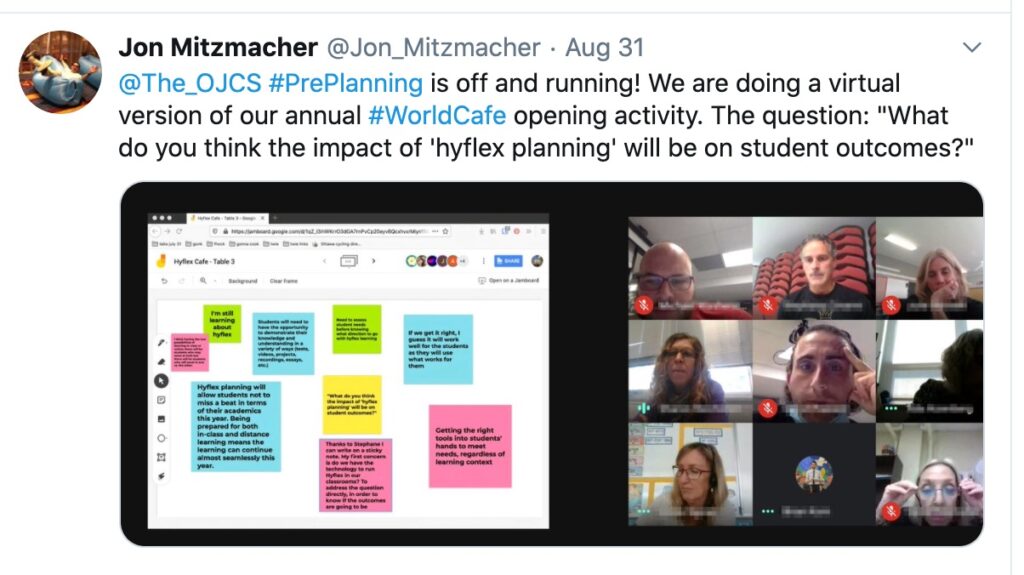
Each year (13 years, 4 at OJCS and counting!), I begin “Pre-Planning Week” with an updated version of the “World Cafe”. It is a collaborative brainstorming activity centered on a key question. Each year’s question is designed to encapsulate that year’s “big idea”. To no one’s surprise, this year’s big idea? Hyflex Learning!
We call it “hyflex” because we are not simply offering a “hybrid” of both in-person and distance learning; we are preparing for the flexibility of students (and teachers) switching from one to the other in both a planned and unplanned fashion. The “flex” stands for “flexibility” and that is as good an adjective for this year as any other.
“Getting Started With Hybrid Learning” with Emma Pass
Thanks to a generous grant from the Jewish Federation of Ottawa, we have been able to bring in some outside experts to work with our teachers during this week of planning. One extraordinary expert is named Emma Pass. Leaving aside the whole hybrid/hyflex thing, her session was an hourlong tour de force of all things hybrid learning that really set the table for the week. Or as our Teaching & Learning Coordinator Melissa Thompson put it:
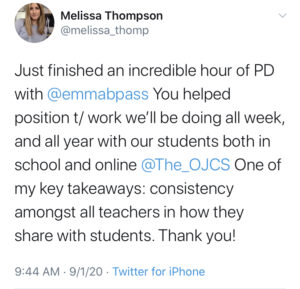
Speed-Geeking Critical Platforms for Hyflex Learning
After having spent some time exploring the big picture, here we began to explore some critical platforms that OJCS teachers are becoming more familiar with in order to succeed in hyflex learning contexts. What do we love about speed-geeking at OJCS? That the sessions are led by our own teachers!
Let’s check out them out!
Classkick
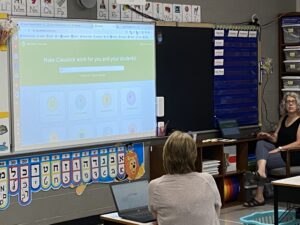 In this session, our Kitah Alef (Grade One) Jewish Studies Teacher Morah Ada shared about Classkick. Classkick is an app that gives a teacher maximal flexibility to incorporate audio, text, video, picture into a shared document that students and teachers can edit and work on seamlessly. For example, a teacher can record herself giving video instruction, embed a PDF and ask students to record their responses all in one document. Teachers can also take pre-prepared documents (like an alef-bet chart) and designate individual letters as student manipulatives. Meaning that a student could drag an “alef” around the document and place it where it belongs.
In this session, our Kitah Alef (Grade One) Jewish Studies Teacher Morah Ada shared about Classkick. Classkick is an app that gives a teacher maximal flexibility to incorporate audio, text, video, picture into a shared document that students and teachers can edit and work on seamlessly. For example, a teacher can record herself giving video instruction, embed a PDF and ask students to record their responses all in one document. Teachers can also take pre-prepared documents (like an alef-bet chart) and designate individual letters as student manipulatives. Meaning that a student could drag an “alef” around the document and place it where it belongs.
Primary teachers can import critical documents like their calendars or job charts. Teachers can easily customize and personalize different assignments. The most exciting part of the session was the conversation between teachers. One of the goals we have as a school is to find more opportunity for our students to use their languages. Classkick makes it really easy for teachers to record themselves giving oral prompts (personalized if needed) and for students to record themselves responding. This will be a great way to build in more authentic contact time with Hebrew and French!
Flipgrid
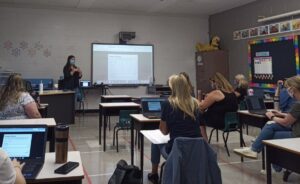 Flipgrid is not new to OJCS, although it may be new to our new teachers. [We made heavy use of it during last year’s PIVOT, especially in the primary grades.] In this session our Grade Two General Studies Teacher Morah Lianna caught us up on all things Flipgrid. Flipgrid essentially allows students to record 90 seconds of video in response to all kinds of prompts. A teacher could ask the class to tell her all about their summer vacations, and each student would record themselves in response. Flipgrid gives you both public and private options for maximal flexibility. Flipgrid also is a great global connector since it is heavily used around the…globe! With a sea of platforms available, one question that our teachers always have to ask is which platform makes sense for which lesson or unit or subject or students? And how can we make choices that don’t overwhelm students (or parents)? (How many logins can anyone manage?)
Flipgrid is not new to OJCS, although it may be new to our new teachers. [We made heavy use of it during last year’s PIVOT, especially in the primary grades.] In this session our Grade Two General Studies Teacher Morah Lianna caught us up on all things Flipgrid. Flipgrid essentially allows students to record 90 seconds of video in response to all kinds of prompts. A teacher could ask the class to tell her all about their summer vacations, and each student would record themselves in response. Flipgrid gives you both public and private options for maximal flexibility. Flipgrid also is a great global connector since it is heavily used around the…globe! With a sea of platforms available, one question that our teachers always have to ask is which platform makes sense for which lesson or unit or subject or students? And how can we make choices that don’t overwhelm students (or parents)? (How many logins can anyone manage?)
Nearpod
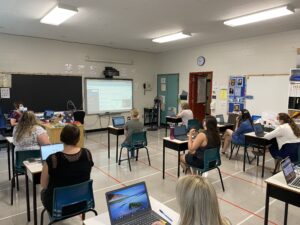 Nearpod is a platform we are eager to begin using at OJCS because of how easily it allows us to factor in both synchronous and asynchronous learning. As explained by our Middle School Hebrew I Teacher Morah Ruthie, Nearpod, is a little like Classkick, but even moreso, and is intended to be a “one-stop shop” for teachers. Nearpod allows a teacher to create lessons that can be delivered by the teacher, or can be done in-class either in groups or individually, or done at home. Lessons can be guided by the teacher or offered to students to do at their own paces. And, critical for these times, lessons can be offered synchronously or asynchronously.
Nearpod is a platform we are eager to begin using at OJCS because of how easily it allows us to factor in both synchronous and asynchronous learning. As explained by our Middle School Hebrew I Teacher Morah Ruthie, Nearpod, is a little like Classkick, but even moreso, and is intended to be a “one-stop shop” for teachers. Nearpod allows a teacher to create lessons that can be delivered by the teacher, or can be done in-class either in groups or individually, or done at home. Lessons can be guided by the teacher or offered to students to do at their own paces. And, critical for these times, lessons can be offered synchronously or asynchronously.
Of the three platforms we explored, Nearpod clearly has the most maximal utility for our teachers. They can pull content from a ton of sources, including virtual reality presentations, YouTube, Google Slides, PDFs, and just about anything and anywhere you can imagine. Teachers can use materials that they have already created, of course. Part of what makes Nearpod so powerful, however, is that it has a full and growing library of lessons across every (general studies) subject and each grade-level. You can even select lessons benchmarked according to (US) national and state standards. You can embed polls, quizzes and activities to keep students engaged and accountable. Finally, the teacher can not only track student progress, but also provide ongoing assessment.
Proficiency Approach to Hebrew Language
Here is the second place we are utilizing grant funding from JFO. As you know, we are in the middle of a major consultancy with our French Language Faculty that we call TACLEF. One thing that we have learned through that experience is how much we would like to give our Hebrew Language Faculty a similar experience. While we cannot (yet) invest in a consultancy of that magnitude, we have begun working with Orly Lavi Travish. We will work with her on the “proficiency approach” to Hebrew language instruction. Proficiency is…
…the ability to use language in real world situations in a spontaneous interaction and non-rehearsed context, and in a manner acceptable and appropriate to native speakers of the language. Proficiency demonstrates what a language user is able to do regardless of where, when, or how the language was acquired. The demonstration is independent of how the language was learned; the context may or may not be familiar; the evaluation of proficiency is not limited to the content of a particular curriculum that has been taught and learned.
Just like with French, we want our Hebrew outcomes to be real, spoken, authentic language. We want to both teach and assess language proficiency in this way. We are way farther ahead in using this approach in French (although not as far as we would like to be) than in Hebrew, but this session will hopefully be the beginning of an exciting Hebrew journey.
Did I do one of my spiritual check-ins on the topic of hitlamdut (mindfulness)? Sure did!
Did Mrs. Thompson do a great session on use of classroom blogs and student blogfolios? Yup!
Did Mrs. Bertrend and Mr. Ray take us all outdoors and show us all the ways we can use our outdoor space for recess, outdoor education and learning? Absolutely!
Did Mrs. Reichstein lead a session on creating a caring and nurturing classroom during these COVID times? You bet!
Did Mrs. Gordon go over all the guidelines and protocols and procedures and rules and mandates to keep us all safe? 100%!
Did the PTA sponsor a yummy breakfast and lunch? Yes!
Did our teachers have lots of time to meet and prepare and collaborate and organize and do all the things needed to open up school on Tuesday? And then some!
All that and much more took place during this week of planning. But at nearly 1,500 words, even I need to stop writing.
Needless to say, we are prepared to do way more than create a safe learning environment. We are prepared to develop a rigorous, creative, innovative, personalized, hyflex and ruach-filled learning experience for each and every one our precious students who we cannot wait to greet (in-person and virtually) on Tuesday morning!
Wishing you and yours a wonderful holiday weekend and a successful launch to the 2020-2021 school year…

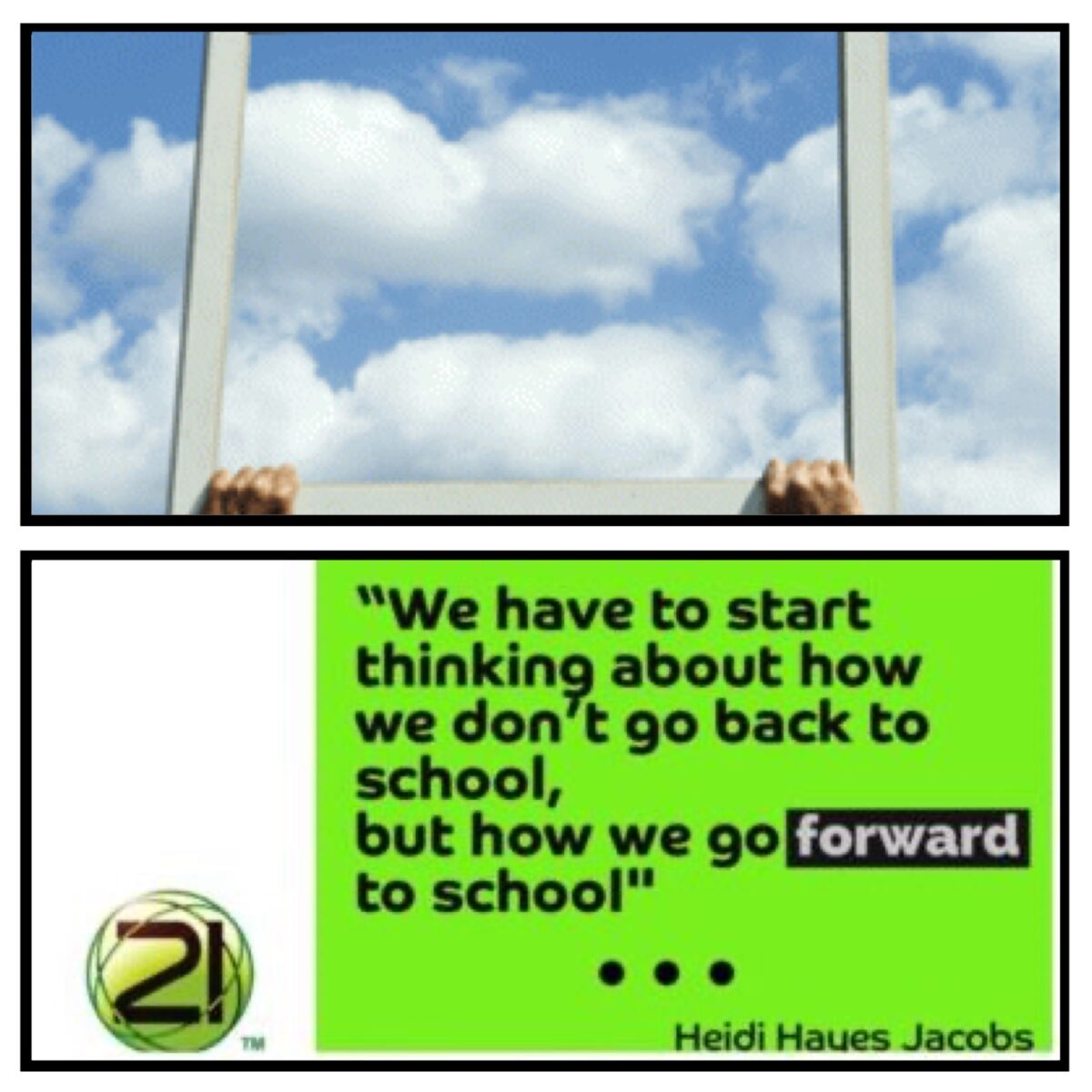
One thought on “The Transparency Files: We Do More Than Plan For COVID”
Comments are closed.